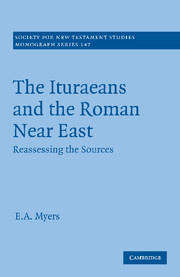Book contents
- Frontmatter
- Contents
- List of illustrations
- Preface
- List of abbreviations
- Introduction
- 1 Early scholarship
- 2 Literary texts
- 3 Archaeology
- 4 Coins
- 5 Inscriptions
- 6 Ituraeans and identity
- 7 The Ituraeans in history
- 8 Conclusions
- Appendix 1 Two small finds and the Ituraeans
- Appendix 2 Inscriptions relevant to the Roman auxiliary units
- Bibliography
- Index
- Frontmatter
- Contents
- List of illustrations
- Preface
- List of abbreviations
- Introduction
- 1 Early scholarship
- 2 Literary texts
- 3 Archaeology
- 4 Coins
- 5 Inscriptions
- 6 Ituraeans and identity
- 7 The Ituraeans in history
- 8 Conclusions
- Appendix 1 Two small finds and the Ituraeans
- Appendix 2 Inscriptions relevant to the Roman auxiliary units
- Bibliography
- Index
Summary
Our knowledge of the Ituraeans as a people/nation, their language, ethnicity, religion and culture is obscured still, through past assumptions and the fallibility of the historical textual material in which they are presented. The centuries that have passed since the Ituraean principality had its existence have clouded what little information can be known, and along with misconceptions inherited from the past the Ituraeans are all but relegated to the realm of Arab brigands and troublemakers. In the political world of today this becomes seriously problematical and highly charged. Although the intent here was not to discuss this issue in light of today's world politics it is, nonetheless, essential to reassess such a subjective, derogatory label. In dealing with inquiry, hence history, the notion cannot be dismissed entirely as we keep in mind that terms common in antiquity take on quite different meanings in the modern world. Such is the diversity of language over long periods of time and between cultures that the reader's interpretation of the written word is of paramount importance.
It can be stated with some certainty that the Ituraeans were a small yet notable component of the Semitic world of ancient Syria-Palestine. In all probability the region they inhabited was of mixed culture and language, in fact a complex society, as it remains so today – Aramaean, Arabian, Armenian, Syrian, Greek and Roman.
- Type
- Chapter
- Information
- The Ituraeans and the Roman Near EastReassessing the Sources, pp. 169 - 175Publisher: Cambridge University PressPrint publication year: 2010

